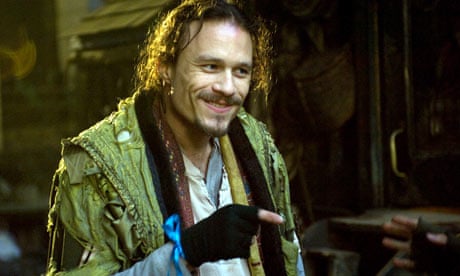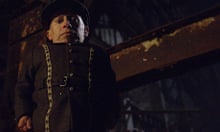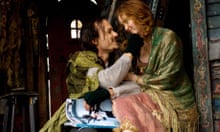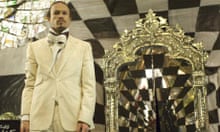Heath Ledger, in his final role as the mysterious outsider Tony in The Imaginarium of Doctor Parnassus, will probably be kept from strict considerations of acting genius by the traditional frolic and froth of a Terry Gilliam picture. Which is all well and good: it was always easier to win an acting Oscar in an Elia Kazan picture than one directed by Jerry Lewis, Preston Sturges or Ernst Lubitsch. That's because Kazan came on to us in a boxer's crouch that said, "Look, I care about acting. I really care." It's part of the great start James Dean got in East of Eden – the role of Cal is so placed and framed that the entire picture says, "Look at him."
But on one occasion, at least, a picture opened like the waves of the Red Sea to reveal Ledger's abilities. I'm thinking of Ang Lee's Brokeback Mountain, from the Annie Proulx story. The performance was a surprise; Ledger had not previously really shown evidence of such depth, calm or simplicity. It wasn't just that he made us believe in a "gay" cowboy; he made us think about Ennis Del Mar, this character who had the generally restricted world view of a Wyoming cowhand. In short, he was playing someone a good deal less educated or worldly than Heath Ledger – and there are actors who are not comfortable playing "dumb". Yet even then, I never lost some feeling with Brokeback of watching an actor attempting a very tricky role, and it is possible this owed something to Ledger's honest (and understandable) fear at playing a gay character.
I found it easier to "lose" myself in his Joker in The Dark Knight. A great deal of that performance lay in the dazzle of the make-up and the showiness of the director's style. It didn't help Ledger at all in a key moment (where he threatens Maggie Gyllenhaal's character) that the camera insisted on whirling around the couple while Ledger's authority begged for stillness.
The most interesting thing about that film, I thought, was his voice and way with words. That's where Ledger began to open up the chilly, demented humour of the Joker and its wounded philosophy. A lot of acting in films is being watchful, and waiting and listening. And these days too much of it, alas, is driving some futuristic vehicle or manning a weapon system that changes the colour of the actor's skin. But even in franchise films like Dark Knight there may be talk, and Ledger won his Oscar when he talked and a fine, warped mind flowered.
No, the Oscar wasn't a surprise, because from the moment of his death (a few months before The Dark Knight opened) it was impossible to extricate his personal impact from the box-office performance of the picture. Sentimentality weighed in and most pundits guessed well in advance that Ledger would win the supporting actor Oscar.
The competition was not intense. His one real rival, Michael Shannon in Revolutionary Road, might have said, with justice, that he really was a supporting actor while Ledger was a masked lead. But these silly things happen at the Oscars all the time, and although the feelings of loss at James Dean's death were greater than they were for Ledger, Dean never won an Oscar. Should he have? Don't ask that futile question – Ledger knew the real answer: all actors should win, including those who don't get the good parts, including those you have never heard of.
It's a game to ask, "What would have happened?" with Ledger – but it's an instructive game. Think of the films that have opened in the year and a bit since he died. Which would you have wanted to play? Benjamin Button? Are you kidding – that's not a part, it's a burial. Revolutionary Road? Possibly, but Kate Winslet needed an older man. And later films? Public Enemies? Nothing there. Funny People? Now, that's an interesting question. The film is terribly flawed but there is a fascinating role in there – one that Adam Sandler plays very well, but that another actor might have handled in a way which erased a lot of the film's mistakes.
You see, that's the lesson: actors can only choose from things offered to them, and often it is impossible to know how a role will develop. Do you realise how long it took for America to realise Cary Grant might be the best actor the movies had ever had? Until a few years before he died. I talked to him a couple of times in that period, and I don't think he was ever remotely persuaded of how good he was.
Think of Mickey Rourke - so cute, so sly, so promising in Diner, Body Heat, Rumblefish and a few other things. Then he got taken over by the armoured idea of "Mickey Rourke" (rather in he way the human being in the Joker has been hijacked by the make-up and the image). So Rourke trashed himself for years and brutalised his own face and body. What happens? He makes a comeback, but doing "Mickey Rourke". He isn't an actor any more.
Or think of Brad Pitt. There was a moment when Pitt was as electric as Rourke. It was the time of Thelma & Louise, A River Runs Through It and Kalifornia. It lived on in Se7en and Fight Club. But see what has happened! Pitt has been overwhelmed by spurious celebrity and dreadful star parts – all those stupid Ocean films, not to mention Button, the Tarantino travesty and so many others. You feel that Pitt longs for his namesake – a pit into which he can vanish, with the remote chance of resurrection some 10 years away.
Not that a Pitt could take comfort from the general pattern of what happens to our great actors. If you want to propose Pacino, De Niro and Nicholson as the outstanding figures of the 70s and 80s, who can be resigned about what has happened to them? They have become pastiches of what they once were. All of which makes the continuing efforts of a Meryl Streep to find good roles a marvel. But Streep may be brighter than the guys, and she may have been a touch more modest in her financial demands.
Early death is depicted as a tragedy for young actors, but it may be a mercy. Dean died with three performances in the bag that might have come to seem his most important. We know now that Marlon Brando made his best films at the beginning. This wasn't just the particular films he had. It was his appetite, his energy and innocence. As time went by, Brando fell out of love with himself and with acting.
Ledger in his early 20s was a young hunk, a nice-looking fellow with some pride and panache. He's watchable in The Patriot, Monster's Ball and Casanova, and helpless in many other things. His very success as the Joker almost certainly means he would have been offered lots of money to spin off a Joker franchise. And one day soon, that might have seemed like a prison as grim as Mission: Impossible.





